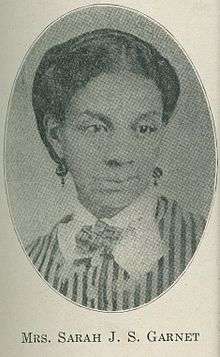Sarah J. Garnet
Sarah J. Tompkins Garnet (née Smith) (July 31, 1831 – September 17, 1911) was an American educator and suffragist from New York City who was a pioneer as the first African-American female school principal in the New York City public school system.[1][2][3]
Sarah J. Garnet | |
|---|---|
 | |
| Born | Sarah Smith July 31, 1831 Brooklyn, New York, US |
| Died | September 17, 1911 |
| Occupation | Educator and suffragist |
Family and early life
Sarah J. Smith, daughter of Sylvanus and Anne (Springsteel) Smith, was born on July 31, 1831, in Brooklyn, New York. Sarah was the oldest of 11 children; her parents were farmers and owned land in Queens County, then part of Long Island.[3][4] Her sister Susan McKinney Steward was the first African-American woman in New York State to earn a medical degree, and the third in the United States.[3]
Sarah married Samuel Tompkins who died in approximately 1852. Her two children from that marriage died prematurely.[3]
Pioneer educator
When Sarah began teaching in New York City, the public schools were racially segregated.[5] Sarah began teaching at the African Free School of Williamsburg in 1854. She was the first African-American woman to be appointed as a principal in the New York City public school system; she took over as principal of Grammar School Number 4 on April 30, 1863.[3] She taught many prominent students, including musician Walter F. Craig.[6]
Garnet retired from active school service in 1900. She served as teacher and principal for 37 years.[7]
Suffrage
Sarah was the founder of the Brooklyn suffrage organization, Equal Suffrage League in the late 1880s. And she was the superintendent of suffrage for the National Association of Colored Women.[3]
Later life, death, legacy
Sarah owned a seamstress shop in Brooklyn from 1883 to 1911.[3]
After noted abolitionist Henry Highland Garnet’s wife died, he and Sarah married. While on an appointment as ambassador in Liberia, Garnet became ill, and he died on February 13, 1882, in Monrovia.[8]
Sarah traveled with her sister Susan to New York, New York, for the inaugural Universal Races Congress of 1911, where Steward presented the paper "Colored American Women". The conference was also attended by W. E. B. Du Bois. Soon after they returned from New York, Steward died at home.[3]
The Teunis G. Bergen School was renamed in 2019 to Sarah Smith Garnet Public School 9 after a movement to remove the slaveholding Bergen Family name from a school whose students are 40% African-American. An article surfaced from June 1819 in which Teunis J. and Michael Bergen had placed an advertisement for a reward of $40 for return of their slaves.[9]
References
- Pollak, Michael (September 12, 2009). "FYI: Pioneering Principals". The New York Times. New York, New York. p. MB10. Retrieved March 13, 2010.
- "Who Were the Women who made up the Suffrage Movement?". University of Louisville Women's Center website. Louisville, Kentucky: University of Louisville. 2008. Retrieved March 1, 2010.
- MacDonald, Meg Meneghel (2007–2009). "Garnet, Sarah J. Smith Tompkins (1831–1911)". BlackPast.org. Archived from the original on July 8, 2011. Retrieved March 12, 2010.
- Logan, Rayford W., and Michael R. Winston (eds) (1982). Dictionary of American Negro Biography. Norton.CS1 maint: multiple names: authors list (link) CS1 maint: extra text: authors list (link)
- Smith, Jessie Carney, ed. (1996). Notable Black American Women. 2. Detroit Michigan: Gale Research Inc. p. 308. ISBN 0-316-10617-8. Retrieved March 13, 2010.
- "Musician who Made his Mark", The New York Age, February 11, 1933, p. 4. Retrieved October 11, 2016.
- Fuller, H. S. (May 31, 1900). "Personal". School: Devoted to the Public Schools and Educational Interests. New York, New York: The School News Company. 11: 319. Retrieved March 1, 2010.
- Polcino, Christine Ann (Fall 2004). "Biography: Garnet, Henry Highland". Literary and Cultural Heritage Map of Pennsylvania Writers. University Park, PA: The Pennsylvania State University. Retrieved March 1, 2010.
- "Teunis & Michael Bergen offer $40 reward for their runaway slaves, Sam & Dinah", Long-Island (Brooklyn) Star, June 16, 1819; via Brooklyn Confidential.